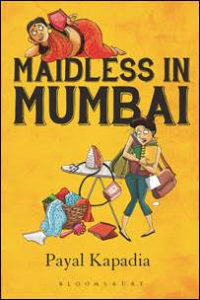Maid in India
On 12 July 2017 a terrible incident happened in Noida, a suburb of Delhi. It involved the alleged illegal confinement overnight of a maid, Zohra, accused of having stolen money from her employers living in one of the recently constructed gated communities. Early next morning people from the village where Zohra lived surrounded the housing complex where she was supposed to be. After that it became ugly — events on the ground and the narratives being circulated and published. One version says she says her employers had not paid her for months. Another one says she asked for a loan against her unpaid wages. Another version says the employers had suspected her of stealing earlier but were only able to confront her now and Zohra had confessed. Whatever the truth in this case ( as it is still under police investigation) the fact is such events expose the vast socio-economic divide which exists between employers and domestic staff, particularly the maids. There are many stories such as this that happen every day, most of which go unreported.
There are so many versions of this one story. In every way it is horrific. #domesticstaffabuse #zohra https://t.co/PvLPpois1x
— Aparna Jain (@Aparna) July 13, 2017
With growing demands and increasing number of nuclear families there is an exponential rise in the demand for maids. Also women from poorer families are being sent to work in middle-class homes as it is perceived as a “win-win” situation where the woman not only earns an income, saves money since her food is taken care of by the employer and she is also “safe” in the employer’s home. But it is far, far more complicated than that; impossible to analyse in one article or book.
Of late there have been books and articles published in India exploring the status of maids. These range from memoir, non-fiction to fiction. The first of these books about maids was Baby Haldar’s memoir A Life Less Ordinary. Baby was working as a maid in Delhi when her employer gave her a notebook and pen to write her story. She wrote it in Bengali and it was translated from Hindi to English by Urvashi Butalia to resounding international acclaim in 2006. Earlier this year Speaking Tiger Books published Pooranam Elayathamby’s Perhaps Tomorrow: The Memoir of a Sri Lankan Housemaid in the Middle East. Pooranam has co-authored it with her husband Richard Anderson.
Recently there have been other perspectives published as well. A seminal book is Tripti Lahiri’s Maid in India just published by Aleph. It is a sobering and disturbing account of maids. It is based on innumerable interviews.
 Award-winning fashion designer Wendell Roderick’s extraordinary collection of short stories Poskem: Goans in the Shadows . It is about the Poskim of Goa. These were young children taken in by wealthy families and retained most often as servants. Through a bunch of short stories focused on events which he says are “all tragically true” though the names and characters are his creations Wendell Rodericks shows
Award-winning fashion designer Wendell Roderick’s extraordinary collection of short stories Poskem: Goans in the Shadows . It is about the Poskim of Goa. These were young children taken in by wealthy families and retained most often as servants. Through a bunch of short stories focused on events which he says are “all tragically true” though the names and characters are his creations Wendell Rodericks shows  another side to this complicated relationship. In the Winter 2015, Granta 130 issue which focused on writing from India, Deepti Kapoor wrote a hard-to-forget story, A Double-Income Family, about a Mrs Mehra and her domestic living in a gated community. And then there is award-winning children’s literature writer Payal Kapadia’s first “grown-up” book Maidless in Mumbai. It has been published by Bloomsbury India and promoted with the blurb: “A funny, irreverent, tongue-in-cheek look at the maid-memsahib relationship on the cusp of social change: the horrifying prospect of being wholly dependent on those we employ; the terrifying notion that maids are a dying breed; and the spectre of surviving in a world without them!”
another side to this complicated relationship. In the Winter 2015, Granta 130 issue which focused on writing from India, Deepti Kapoor wrote a hard-to-forget story, A Double-Income Family, about a Mrs Mehra and her domestic living in a gated community. And then there is award-winning children’s literature writer Payal Kapadia’s first “grown-up” book Maidless in Mumbai. It has been published by Bloomsbury India and promoted with the blurb: “A funny, irreverent, tongue-in-cheek look at the maid-memsahib relationship on the cusp of social change: the horrifying prospect of being wholly dependent on those we employ; the terrifying notion that maids are a dying breed; and the spectre of surviving in a world without them!”
 It is an extremely tangled socio-economic relationship that exists in Indian society today. As Veena Venugopal, journalist and author, wrote recently in “Pop goes the class bubble” ( Hindu Blink, 30 June 2017) :
It is an extremely tangled socio-economic relationship that exists in Indian society today. As Veena Venugopal, journalist and author, wrote recently in “Pop goes the class bubble” ( Hindu Blink, 30 June 2017) :
Class and caste difference are, of course, endemic to India. Yet, never before in our history have so many people managed to employ so many others in their service. Predictably, we are unsure about the exact terms of that engagement. An Indian upbringing instinctively teaches us to negotiate for everything. And so we do, browbeating the maid to take ₹1,000 less in her salary, offering the driver an overtime and then arguing about the calculation of it. And then we go shopping, and hey! everything’s on sale, and we don’t even realise when the bill gets to ₹15,000. The maid sees this. She knows enough mathematics to calculate how many months’ salary that is. But we carry on — consumption is our entitlement, social parity is not our problem. Until, one day, we turn around and find two decades of resentment standing in our kitchen, bearing a knife that is not intended to be used for dicing potatoes. “Shocking”, we’ll all say when we hear that account.
For a while, a couple of years ago, with the intention of writing a book, I researched stories of housemaids in India. The accounts of employers — people like us — that I heard were horrific. No holidays, no food, no increments, no healthcare and, more often than you’d think, no pay even. In an ad that was running on television those days, Amitabh Bachchan scolded his help for buying the wrong brand of bulb, and said, “Please stop this habit of thinking”. Several helps I spoke to referred to this ad. “It’s bad for you when we think,” one said, “because in your hearts you know that you haven’t done anything to deserve happy thoughts from us.”
In this uneasy, mutually suspicious cohabitation lies the real future of the country’s social fabric.
13 July 2017
